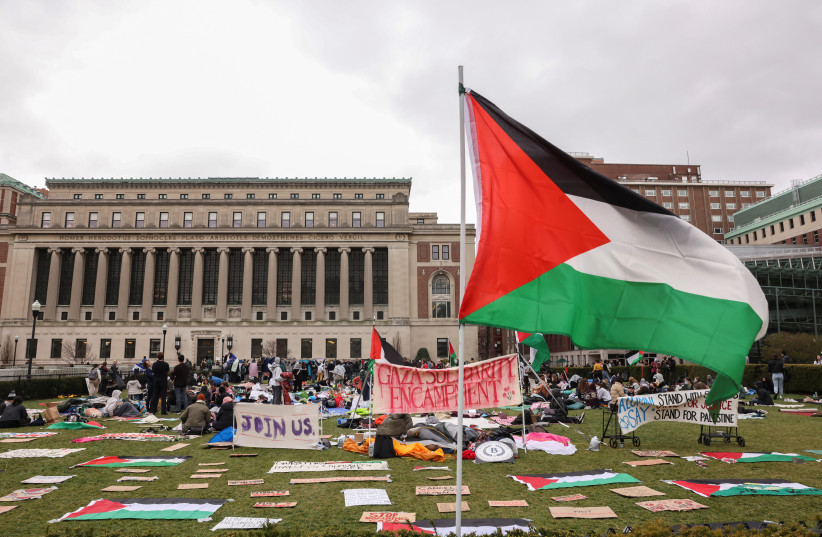The tail-end of Columbia University’s academic year is usually a special time. With examinations complete and summer looming, thousands of soon-to-be graduates, clad in light blue and white, gather around the steps of Low Library alongside faculty members to bask in the culmination of their academic journey. Family members and friends look on from the bleachers with pride to celebrate money and time well spent.
However, this year will be remembered as an annus horribilis.
Mere weeks after Manhattan’s sole Ivy League school was brought to a standstill by protests, a building takeover, and an encampment orchestrated by student and non-student groups over Israel’s war with Hamas in Gaza, university administrators have canceled its university-wide commencement ceremony.
Instead, the university’s main campus will remain eerily and uncharacteristically quiet for this time of year, with smaller, school-level graduation celebrations held mostly 100 blocks north at Columbia’s Baker Athletics Complex.
This was a missed opportunity for the university.

Rather than send a symbolic message of unity and proceed with one large commencement ceremony for all, it has decided to splinter out of security concerns. To not risk further agitation it is ending the year in literal division. In essence, the administration has rewarded the scare tactics of pro-Palestinian demonstrators.
Looking back on the trajectory of the campus protests at Columbia, it’s worth entertaining a question not asked nearly enough: What would college campuses like Columbia, and other institutions canceling or curbing commencement festivities, look like today had pro-Palestinian demonstrations not been colonized by hateful agitators who despise Israel and, in many cases, Jewish people far more than they support Palestinian rights?
It is certainly true that not all who participated in Columbia’s campus protests were violent or chanted antisemitic slogans. Consistent with Columbia’s vaunted legacy of dissent and protest culture stretching back to the Vietnam protests in the 1960s, many students opted to take part in the Gaza encampment out of concern for the plight of Gazans caught in the cross-hairs of Israel’s war with Hamas, in response to Hamas’s atrocities of October 7.
Hate was allowed to fester
From the outset of the Columbia protests, intolerance was tolerated. Hate was allowed to fester.
“From the river to the sea, Palestine will be free” and “Globalize the Intifada” became the battle cries spouted by students who may or may not have known (or not cared for) the violent, eliminationist meaning of their words.
The movement accommodated an ideology that threatened and harassed Jewish students, even forcing many, at the advice of a rabbi affiliated with the university, to flee and remain home “until the reality in and around campus has dramatically improved.”
JEWISH STUDENTS had good reason to be scared. These were not isolated incidents. In and around Columbia’s campus, crowds taunted Jewish students to “Go back to Poland!” A masked protester yelled at Jewish students that the massacre of 1,200 mostly Israeli civilians on October 7 would happen “not one more time, not five more times, not 10 more times, not 100 more times, not 1,000 more times.” The line between free speech and violent harassment was eviscerated in many cases.
A student proudly paraded the logo of Hamas, a designated terrorist entity, on his phone outside of Butler Library, stating that he could not remove his mask because he belongs to Hamas. Another student held a sign pointing to Jewish students waving Israeli and American flags and quietly playing Israel’s national anthem that they should be “Al-Qassam’s Next Targets.” Al-Qassam is the military wing of Hamas.
Some pro-Palestinian demonstrators publicly disavowed this toxic rhetoric while also expressing frustration about the media being distracted by “focusing on inflammatory individuals who do not represent us.”
It is also true that not everyone harassing Jewish students and causing unrest on campus are Columbia students. The trouble is that when these instances of bigotry and unambiguous antisemitism occur over and over, with little done to stamp it out, they do end up representing – and sullying – the movement that gave rise to them.
Like when a key spokesperson of the pro-Palestinian encampment, Khymani James, is recorded saying that “Zionists don’t deserve to live,” or when Jewish students are pushed around and have rocks thrown at their faces.
Yet all hope is not lost.
While Columbia sits in this trough alongside other elite universities, we are also presented with the chance to lead others out of this darkness. We can set an example for colleges around the world to follow. We can demonstrate much-needed leadership regarding how to foster a culture of free expression while also vigorously protecting every student’s right to learn and thrive in an environment free from harassment or violence.
After all, Columbia’s motto reads: In your light shall we see the light.
Jonathan Harounoff is a journalist and 2019 graduate of Columbia Journalism School @JonathanHaroun1.
Jessica Schwalb is a junior studying human rights at Columbia College @jessicaschwalb7.
